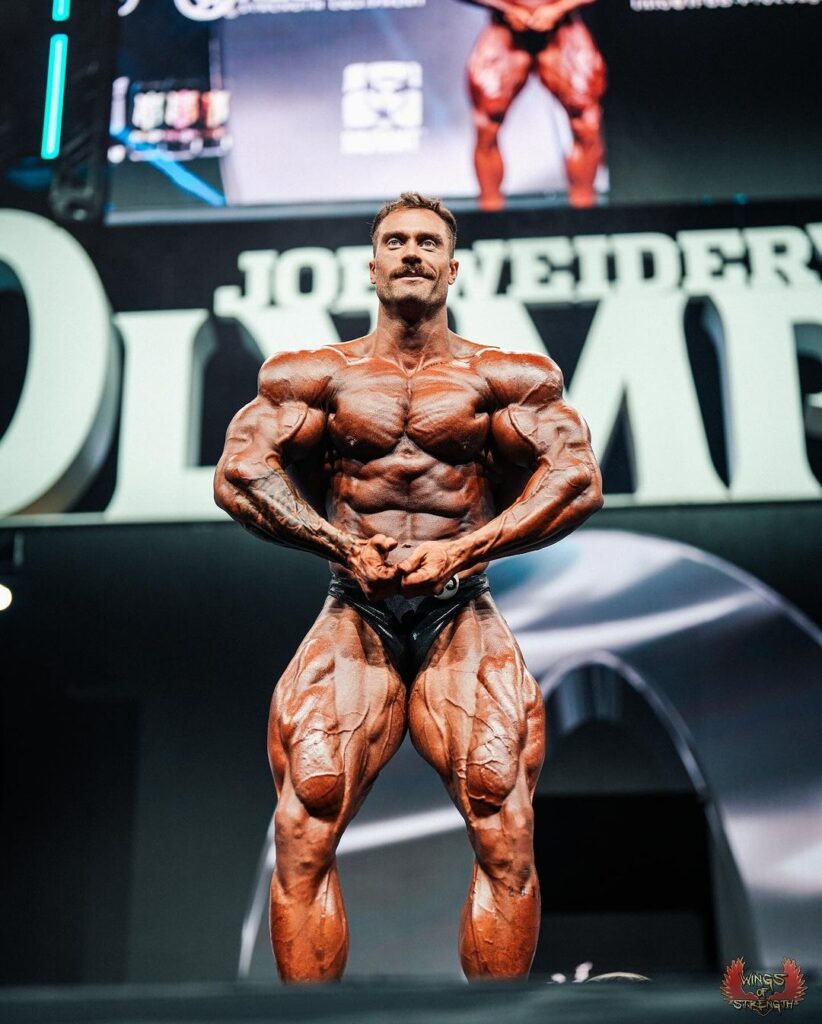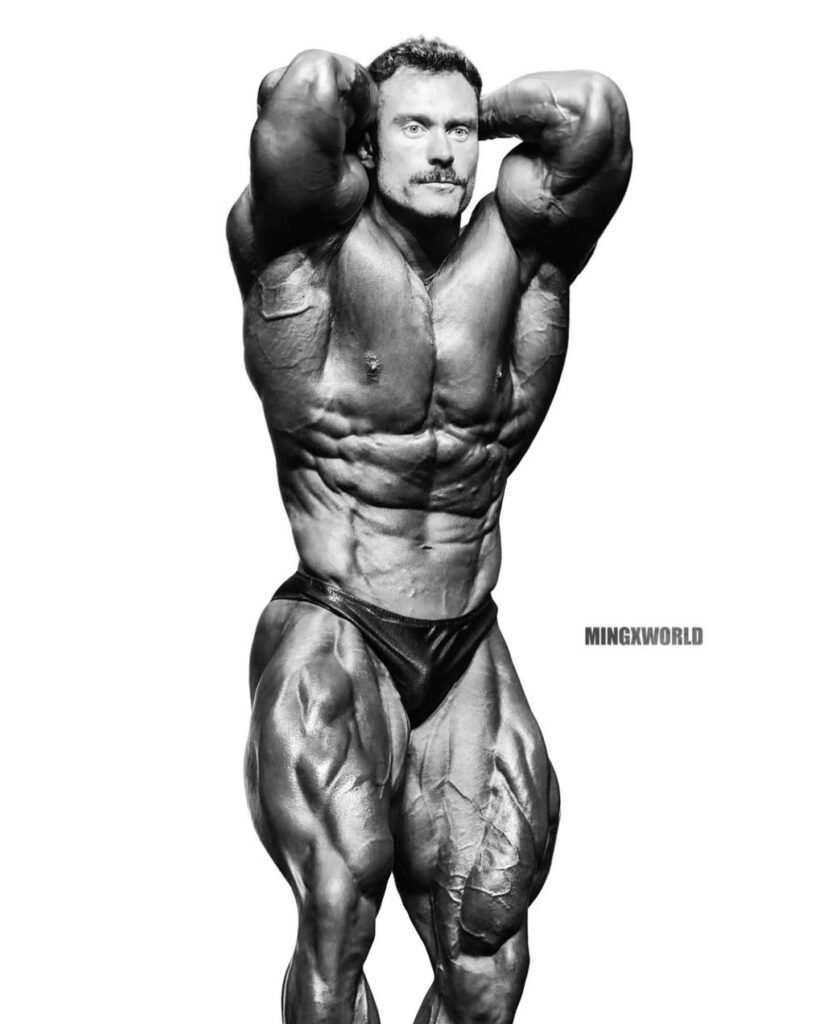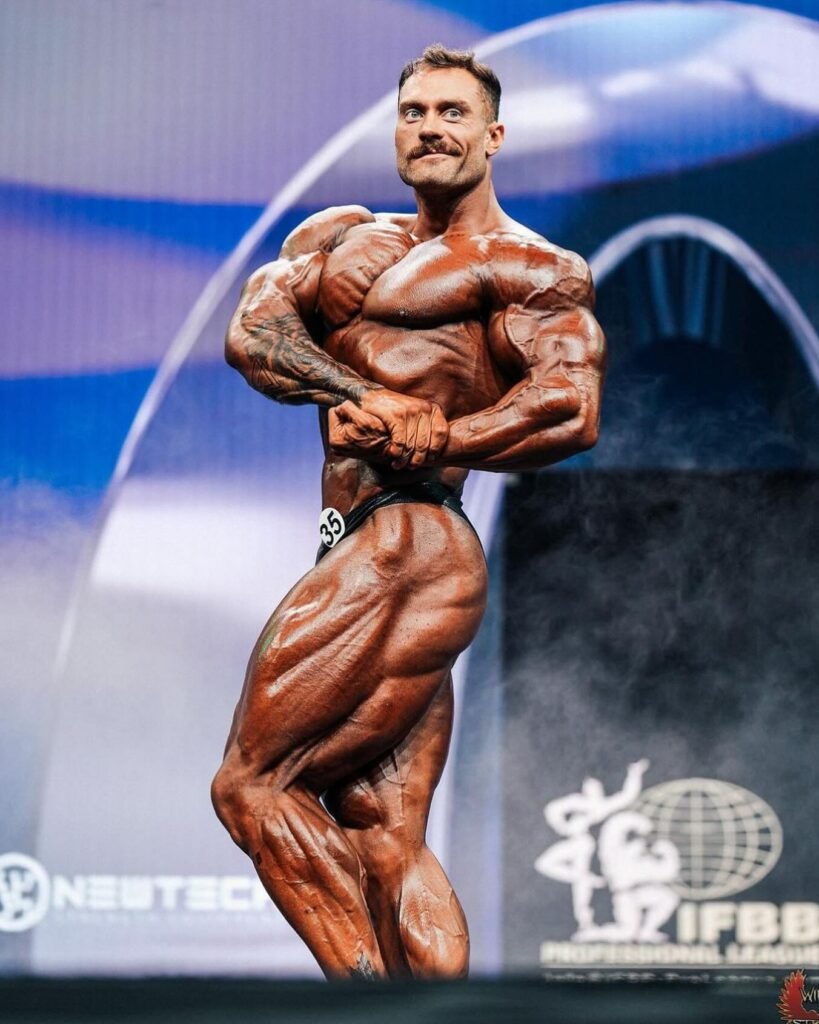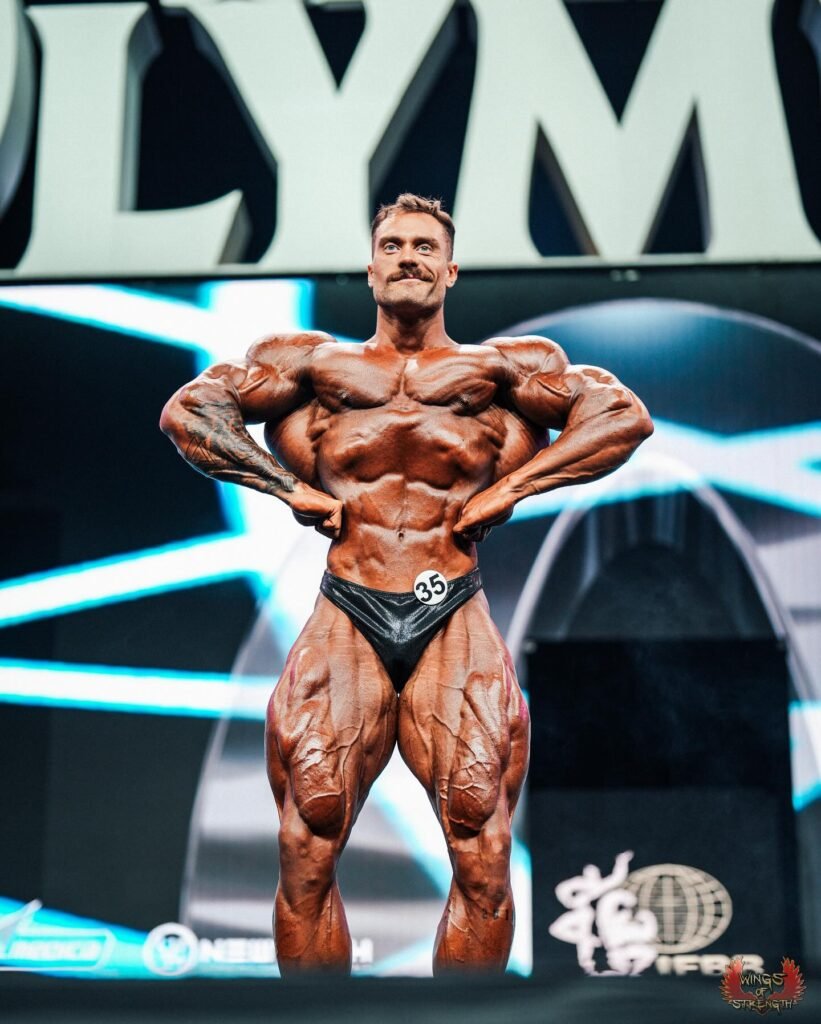Chris Bumstead, the reigning Classic Physique Mr. Olympia, is a name that has become synonymous with excellence in bodybuilding.
With a physique reminiscent of the Golden Era of bodybuilding and a reputation for being candid with his fans, Chris Bumstead has sparked numerous discussions about his training regimen, diet, and, most controversially, his use of performance-enhancing drugs (PEDs).
The World of Bodybuilding and Supplementation
Bodybuilding is a sport that demands rigorous training, strict dieting, and often, the use of supplements to achieve the desired muscle mass and definition.
Over-the-counter supplements like creatine and protein powders are staples for many athletes, aiding in recovery and muscle growth.
However, the results seen in top-level competitors, particularly those gracing the Mr. Olympia stage, lead many to question if these supplements alone can produce such physiques.
In the age of social media, where fitness influencers showcase their shredded bodies under perfect lighting, the pressure to emulate these physiques is immense.
This has led to an increased interest in substances like Selective Androgen Receptor Modulators (SARMs) and anabolic steroids among young gym-goers.
Chris Bumstead’s Advice on Steroid Use

Chris Bumstead, widely regarded as one of the most influential figures in modern bodybuilding, has been open about his stance on steroid use.
During a 2021 Q&A session, Chris Bumstead addressed whether steroids should be considered by aspiring bodybuilders. His response was clear and emphatic:
“THE ANSWER IS NO,” said Bumstead. “I HAVE THIS NEW THEORY WHERE IF YOU HAVE TO ASK SOMEONE ELSE IF YOU SHOULD TAKE SOMETHING POTENTIALLY HARMFUL TO YOUR BODY, THE ANSWER IS ALREADY NO. THAT DECISION HAS TO BE YOUR OWN, AND IT HAS TO BE A WELL-EDUCATED DECISION, BECAUSE PEOPLE LIKE BODYBUILDING FOR A FEW YEARS, AND THEY TAKE STEROIDS AND THEY’LL BE LIKE ‘I DON’T ACTUALLY LIKE BODYBUILDING.’ THEN THEY’LL QUIT BODYBUILDING, AND THEIR BODY IS STILL FKED UP FROM THE JUICE OR WHATEVER THEY TOOK IN THE MEANTIME. SO THAT DECISION, YOU SHOULDN’T ASK ANYBODY THAT. YOU SHOULD JUST KNOW, AND YOU SHOULD BE FKING DEDICATED TO WANTING TO DO IT. SO NO, YOU SHOULDN’T IF YOU’RE ASKING ME THAT.”
Chris Bumstead’s response highlights the importance of personal responsibility and informed decision-making when it comes to steroid use.
He emphasizes that if one is uncertain or feels the need to seek validation from others, they are likely not ready to make such a significant commitment.
Chris Bumstead’s Steroid Cycle: Transparency and Responsibility
In June 2022, Chris Bumstead provided more insights into his steroid usage, revealing that he had significantly reduced his steroid cycle for health reasons and still managed to improve his physique.
Initially, he admitted to using up to five different compounds simultaneously when he began his career. However, as he matured in the sport, he scaled back to one or two compounds.
Chris Bumstead did not disclose the exact substances he uses, out of concern that others might mimic his regimen without proper knowledge.
He did mention using 200 mg of testosterone weekly in the offseason, a dosage akin to Testosterone Replacement Therapy (TRT).
This dosage might increase to around 500 mg weekly during contest prep, along with the addition of one or two other compounds.
This approach underscores Chris Bumstead’s philosophy of using the lowest effective dose to achieve his goals while prioritizing his health.
He advocates for regular bloodwork and monitoring to ensure that all health markers remain in optimal ranges.
RELATED: Sadik Hadzovic Talks about the ‘Dark Side’ of Steroid Use
Diet: The Foundation of Chris Bumstead’s Success

Beyond steroids, Chris Bumstead places a significant emphasis on diet, which he describes as “perfect.” He firmly believes that no amount of PEDs can compensate for a poor diet.
A meticulously planned diet, rich in the right balance of macronutrients—proteins, fats, and carbohydrates—is crucial for building and maintaining a championship physique.
Chris Bumstead’s diet is not just about hitting macronutrient targets but also about consuming high-quality foods that support overall health and well-being.
This disciplined approach to nutrition has been a cornerstone of his success and is something he consistently advocates to his followers.
The Question of Natural Bodybuilding
The term “natural” in bodybuilding can be contentious. For many, being natural means abstaining from any performance-enhancing drugs, including steroids, SARMs, and even hormone replacement therapies like TRT.
these standards, Chris Bumstead is not natural, as he has openly discussed his use of steroids.
However, Chris Bumstead’s transparency about his usage, coupled with his emphasis on health and responsible use, sets a positive example in a sport often plagued by secrecy and misinformation.
His willingness to share his experiences helps educate aspiring bodybuilders about the realities and risks associated with steroid use.
The Impact of Steroids on Bodybuilding

The use of steroids in bodybuilding is a polarizing topic. On one hand, steroids can significantly enhance muscle mass, strength, and recovery, allowing athletes to push beyond natural limits.
On the other hand, they carry substantial health risks, including cardiovascular problems, liver damage, hormonal imbalances, and psychological effects.
Chris Bumstead’s approach to steroids reflects a growing awareness in the bodybuilding community about the importance of health and longevity.
By using the lowest effective doses and closely monitoring his health, Chris Bumstead aims to mitigate the risks while still achieving his competitive goals.
Steroids: Not a Magic Solution
Despite their potent effects, steroids are not a magic solution. Achieving a physique like Chris Bumstead’s requires years of intense training, strict dieting, and unwavering dedication.
Steroids can enhance results, but they cannot replace the hard work and discipline required to succeed in bodybuilding.
Chris Bumstead’s journey underscores the importance of a holistic approach to bodybuilding.
Training, diet, recovery, and mental well-being all play critical roles in achieving and maintaining a top-tier physique.
Steroids are just one piece of the puzzle, and their use should be approached with caution and respect.
The Role of Genetics
Genetics plays a significant role in bodybuilding success. Some individuals are naturally predisposed to building muscle and losing fat more efficiently than others.
Chris Bumstead’s genetic makeup has undoubtedly contributed to his success.
His muscle insertions, bone structure, and overall body composition give him an edge that, combined with his hard work and disciplined approach, has propelled him to the top of the sport.
Understanding the role of genetics can help aspiring bodybuilders set realistic expectations and goals.
While steroids and supplements can enhance one’s physique, they cannot change an individual’s genetic potential.
Recognizing and working within one’s genetic limits is crucial for long-term success and satisfaction in bodybuilding.
The Mental Aspect of Bodybuilding

Bodybuilding is as much a mental challenge as it is a physical one.
The discipline required to maintain a strict diet, endure grueling workouts, and make necessary lifestyle sacrifices demands a strong mental fortitude.
Chris Bumstead’s success is a testament to his mental toughness and resilience.
Chris Bumstead often speaks about the mental challenges he faces, from dealing with the pressures of competition to maintaining motivation during the offseason.
His openness about these struggles provides valuable insights for aspiring bodybuilders and highlights the importance of mental health in achieving one’s goals.
The Influence of Social Media
Social media has transformed bodybuilding, providing athletes with platforms to showcase their physiques, connect with fans, and share their journeys.
Chris Bumstead has leveraged social media to build a massive following, sharing insights into his training, diet, and competition prep.
However, social media can also create unrealistic expectations. The curated images and highlight reels often do not reflect the hard work, setbacks, and struggles behind the scenes.
Chris Bumstead’s candid approach helps demystify the process and provides a more realistic portrayal of what it takes to succeed in bodybuilding.
RELATED: Classic Physique Chest Training With C Bum, Ramon Dino, Urs Kalecinski, and Wesley Vissers
The Importance of Education
Educating oneself about the realities of bodybuilding, including the use of steroids, is crucial for anyone considering entering the sport.
Chris Bumstead’s emphasis on making well-informed decisions highlights the importance of education.
Understanding the potential risks and benefits, as well as the ethical considerations, is essential for making responsible choices.
There are numerous resources available for those seeking information about steroids and bodybuilding, from scientific studies and medical professionals to reputable bodybuilding forums and athletes like Chris Bumstead who share their experiences.
Chris Bumstead’s Legacy

Chris Bumstead’s legacy in bodybuilding extends beyond his impressive list of titles. His transparency, dedication to health, and willingness to share his journey have made him a respected figure in the sport.
Chris Bumstead’s approach serves as a model for aspiring bodybuilders, emphasizing the importance of health, education, and personal responsibility.
As Chris Bumstead continues to compete and inspire, his impact on the sport will undoubtedly endure.
His message of balance, discipline, and integrity resonates with a new generation of bodybuilders who look up to him not only for his physique but for his values and approach to the sport.
Conclusion
The question of whether Chris Bumstead is natural is complex. By the strictest definitions, he is not, as he has openly discussed his use of steroids.
However, his transparency, responsible use, and emphasis on health set a positive example in the bodybuilding community.
Chris Bumstead’s journey highlights the importance of education, personal responsibility, and a holistic approach to bodybuilding that prioritizes health and well-being.
In the world of bodybuilding, where the pressure to achieve a perfect physique can lead to risky decisions, Chris Bumstead stands out as a voice of reason.
His message is clear: steroids are not a shortcut to success, and achieving a championship physique requires dedication, hard work, and a commitment to health.
Aspiring bodybuilders can learn much from Chris Bumstead’s approach, using his example to navigate the challenges and opportunities in the sport.
Source:
- Chris Bumstead’s Official Instagram Account
- Facebook Page
- Chris Bumstead YouTube Channel
- Personal interviews featured in various magazines